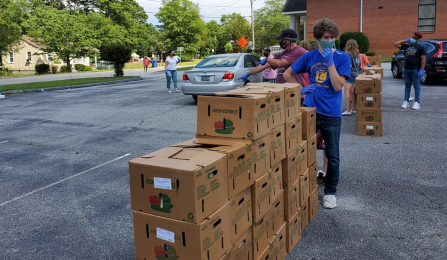
Sep 17, 2020 | Community News, News
In Columbia, the zip code 29203 is well-known for health disparities and inequities of all kinds. That’s why many public health and health care organizations often focus their community health improvement efforts on this community. The National Action Network (NAN) of Columbia knew the realities of this community and provided a Juneteenth food distribution kickoff event, partially funded by Eat Smart Move More South Carolina, to help fill the need for food in this food desert.
food in this food desert.
NAN Columbia partnered with Reid Chapel AME Church, Harvest Hope Food Bank, Dianne’s Call, Emmaus Church, North Columbia Youth Empowerment Zone, and Every Black Girl to help promote the food distribution and leverage food supplies. They recruited 40 volunteers to help organize and handout food boxes.
“We impacted 200 families with produce for two weeks with another anticipated 200 within the next two weeks,” said Tiffany James, NAN Columbia president.
NAN Columbia is a chapter of the national civil rights non-profit lead by Reverend Al Sharpton, which promotes a modern civil rights agenda that includes the fight for one standard of justice, decency, and equal opportunities for all people. To learn more about NAN Columbia, visit their Facebook page.
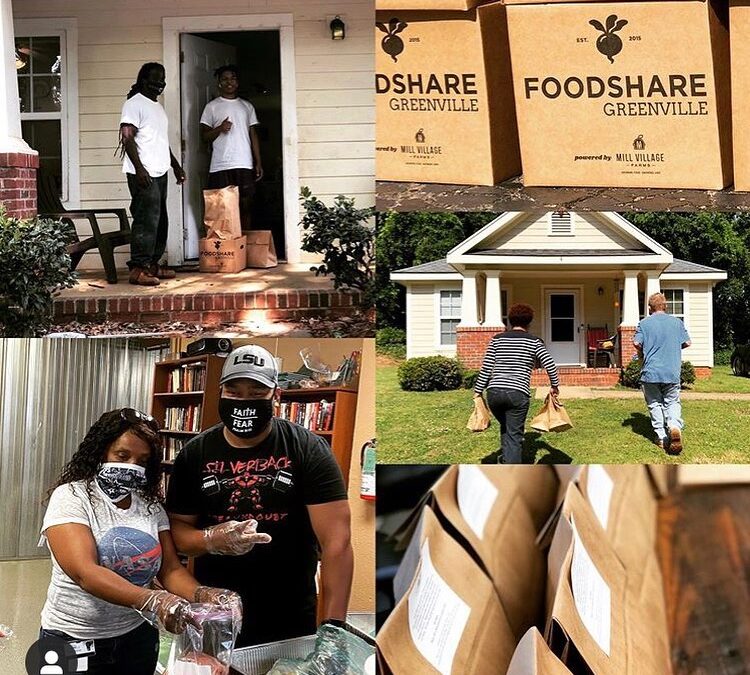
Sep 17, 2020 | Community News, News
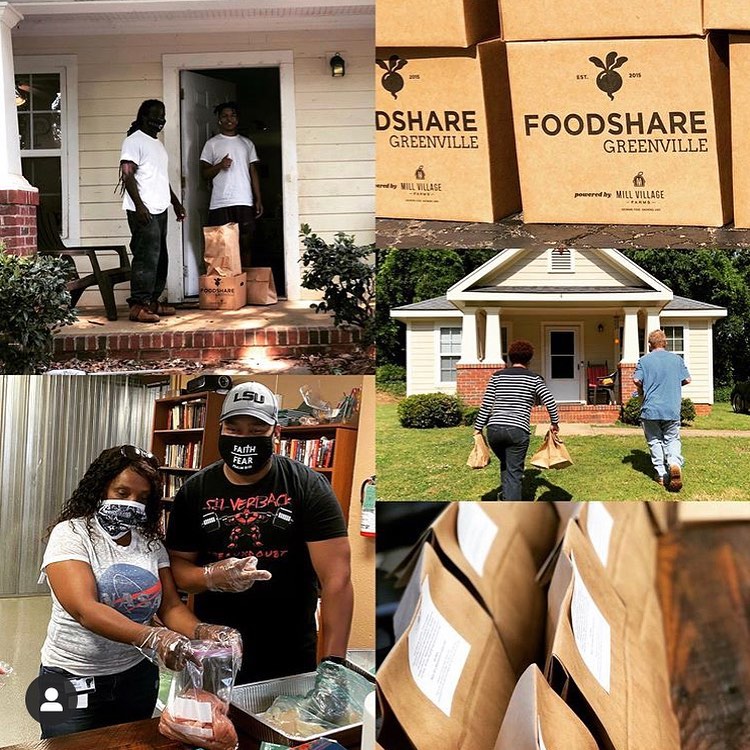 Believe it or not, food deserts do exist in urban areas. Why? Because all neighborhoods in cities are not equal. Grocery stores don’t want to put down roots in low-income neighborhoods because they fear they won’t be successful. In Greenville, Mill Village Farms is changing that landscape and stepping up their efforts to make sure residents get fresh, locally grown produce during the coronavirus pandemic.
Believe it or not, food deserts do exist in urban areas. Why? Because all neighborhoods in cities are not equal. Grocery stores don’t want to put down roots in low-income neighborhoods because they fear they won’t be successful. In Greenville, Mill Village Farms is changing that landscape and stepping up their efforts to make sure residents get fresh, locally grown produce during the coronavirus pandemic.
“With the Eat Smart Move More Rapid Response Mini-Grant funding, we were able to purchase the produce for 300 FoodShare boxes. Each box contains enough produce for a family of four for about two weeks,” said Dan Weidenbenner, executive director at Mill Village Farms.
They partnered with 24 partner sites in priority locations throughout Greenville County and their drive-thru site at the United Way of Greenville County to distribute an average of 1,300 FoodShare boxes in the month of May to SNAP participants and those who self-identified as in need. In addition, they gained at least 20 new partner agencies (churches and community organizations) throughout Greenville County who are interested in partnering to distribute FoodShare boxes in the community.
“Since receiving the Eat Smart Move More Rapid Response Mini-Grant, we have raised an additional $100,000 through a virtual culinary concert fundraiser and have partnered with produce suppliers to distribute 500 additional fresh produce boxes per week through the USDA Farmer to Families Food Box Program,” said Weidenbenner.
Mill Village Farms transforms vacant properties into bountiful gardens to grow locally sourced produce for communities that often have limited access to fresh and local foods. Their goal is to empower youth with experiences in basic job skills, sustainable agriculture, and entrepreneurship. The produce grown in their gardens is shared with youth and residents and used in FoodShare boxes. For more information, visit the Mill Village Farms website.
FoodShare South Carolina is a nonprofit organization whose mission is to ensure access to fresh produce for everyone in all communities. They want to enhance the quality of life by creating access to fresh affordable food, quality cooking and skills education. There are five locations around the state: Columbia, Greenville, Orangeburg, Spartanburg, and Lee County. For more information about FoodShare South Carolina and their locations, visit their website.
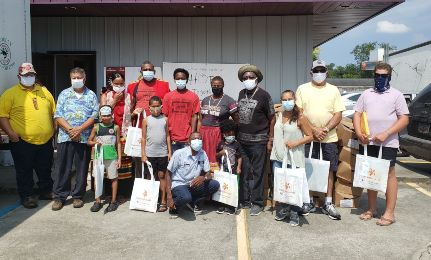
Sep 17, 2020 | Community News, News
 Imagine living in a large, rural area that only has one grocery store. Add COVID-19, social distancing, school closings, and increased unemployment to that scenario. Do you think you would have a tough time finding food to feed your family? About 24,000 people in western Orangeburg County did, and they continue to struggle to find healthy food.
Imagine living in a large, rural area that only has one grocery store. Add COVID-19, social distancing, school closings, and increased unemployment to that scenario. Do you think you would have a tough time finding food to feed your family? About 24,000 people in western Orangeburg County did, and they continue to struggle to find healthy food.
The Pine Hill Indian Community Development Initiative (PHICDI) stepped in to provide healthy food to more than just their American Indian population. They help all families in need, and they continue to do that to this day. Eat Smart Move More South Carolina awarded PHICDI a mini-grant for food distribution supplies that supplemented their existing food distribution events.
“Our ongoing COVID-19 emergency food distribution began May 8 on alternating weeks through September 4th. Each food distribution reached approximately 300 people,” said Michelle Mitchum, Chief of Pine Hill Indian Tribe.
Funds were used to purchase bags for the food distributions and assembly equipment to increase the efficiency of distribution preparations. Existing partners and community volunteers assisted with event preparation and food distributions.
PHICDI’s mission is to rejuvenate western Orangeburg county through developing programs that create and balance food security, access to healthcare, educational success, create jobs, preserve history, and celebrate the rich heritage represented in the area. To learn more about the Pine Hill Indian Community Development Initiative, visit their website or Facebook page.
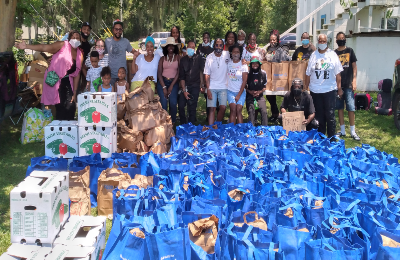
Sep 17, 2020 | Community News, News
 Since the days of enslavement, the Gullah Geechee community has faced injustice, hardships, and many challenges that have shaped their integrity and commitment to sustaining their culture and their people. When COVID-19 hit, Gullah Geechee organizations, particularly on St. Helena Island in Beaufort County, came to the rescue of those in need of food due to unemployment, school closures, and other causes of food insecurity.
Since the days of enslavement, the Gullah Geechee community has faced injustice, hardships, and many challenges that have shaped their integrity and commitment to sustaining their culture and their people. When COVID-19 hit, Gullah Geechee organizations, particularly on St. Helena Island in Beaufort County, came to the rescue of those in need of food due to unemployment, school closures, and other causes of food insecurity.
Gullah Geechee Initiative Foundation, Inc. (GGIF) received a Rapid Response Grant from Eat Smart Move More South Carolina to assist in purchasing healthy food and personal protective equipment specifically for a food distribution event centered around Juneteenth – the annual celebration commemorating freedom for slaves.
“Eat Smart Move More South Carolina was the first to contribute to our food distribution project. This allowed us to leverage additional funding from businesses such as Walmart,” said Kamal Wigfall, executive director of GGIF.
More than 200 bags of non-perishable food and 150 boxes of fresh fruit and vegetables were given away to anyone in need. In addition to free food, dental products and voter registration forms were also distributed.
They leveraged funds and other resources through partners like Community Resource Center North Charleston, Simba League, Beaufort County Black Chamber of Commerce, SC DHEC, Walmart Nos. 7181 and 1383, Marshview Community Organic Farm, Girl Scouts Troop 4105, and the Beaufort County Board of Voter Registration & Elections.
GGIF is a non-profit organization that provides athletic, cultural, and academic services to the young people of St. Helena Island, SC, preparing them for community service and a life of excellence. They foster knowledge of self and preventing youth from engaging in juvenile delinquency and performing poorly academically.
For more information about the Gullah Geechee Initiative Foundation, Inc. visit their website.
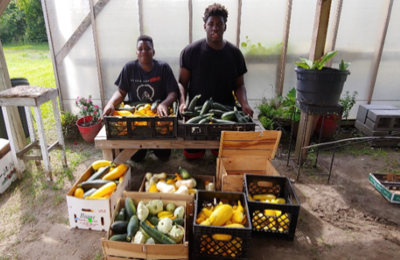
Sep 17, 2020 | Community News, News
 The Gullah Geechee people aren’t strangers to living off the land and consuming fresh, locally grown produce. They cherish their culture – from food and music to ways of life and their people. When the coronavirus pandemic reared its ugly face, Marshview Community Organic Farm sprang into action and applied for a Rapid Response Grant to deliver free, hot meals to seniors, children, and families at risk of food insecurity on St. Helena Island in Beaufort County.
The Gullah Geechee people aren’t strangers to living off the land and consuming fresh, locally grown produce. They cherish their culture – from food and music to ways of life and their people. When the coronavirus pandemic reared its ugly face, Marshview Community Organic Farm sprang into action and applied for a Rapid Response Grant to deliver free, hot meals to seniors, children, and families at risk of food insecurity on St. Helena Island in Beaufort County.
“We are blessed to have such caring and compassionate supporters, who have not only opened their hearts but their wallets to help meet the needs of our community. When we pull together to help one another, we all reap a blessing,” said Sara Reynolds Green, owner of Marshview Community Organic Farm.
In conjunction with the South Carolina Coastal Community Development Corporation, the Gullah Grub Restaurant, the New Life Deliverance Temple and a host of other community organizations, Marshview Community Organic Farm and their partners delivered 2,450 hot meals over seven weeks.
“Meals delivered to senior citizens in their homes adds a vital layer of social contact and informal wellness checks for this vulnerable population,” said Green. “The single parents and the disabled populations are served through the drive-through meal pick-up and volunteers delivering to their homes.”
Marshview Community Organic Farm is a sanctuary for youth to learn about farming and work the land to provide local produce to the community in hopes of improving the health of the community. The farm focuses on training and promoting sustainable agriculture, traditional Gullah style cooking, eating and planting in season, healthy eating habits, and character development. Sara’s husband, Chef Bill Green, owns and runs the Gullah Grub, a restaurant that serves Gullah cuisine using produce from the farm.
On a side note, South Carolina’s Gullah Geechee communities, Marshview Community Organic Farm, and the Gullah Grub restaurant are all featured in an episode of Taste the Nation with Padma Lakshmi on Hulu.
The Green’s and their partners continue their efforts to feed the community during the pandemic. To learn more about this effort, visit the Marshview Community Organic Farm website or their Facebook page.
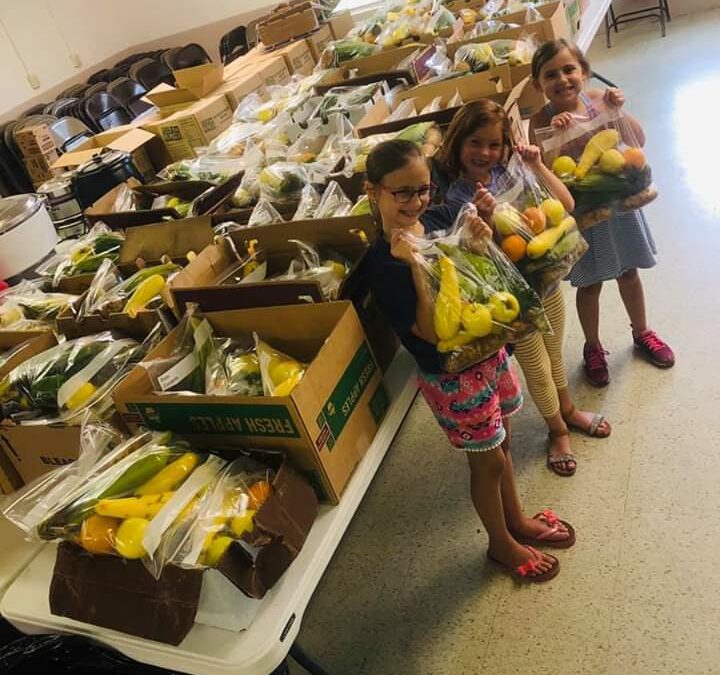
Sep 17, 2020 | Community News, News
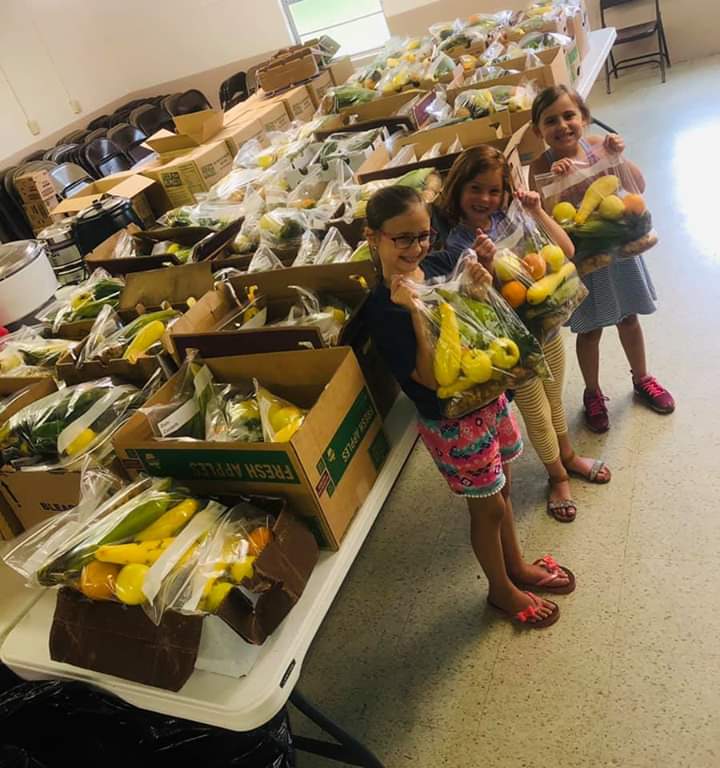 Christian-based organizations across the state have stepped up their mission-driven work to help their communities in times of crisis. In His Name-Colleton is one of those organizations that recognized the increased food insecurity problem caused by COVID-19 and need help to reach more people. They applied for a Rapid Response Grant from Eat Smart Move More South Carolina to pay for healthy food and personal protective equipment associated with their food distribution program.
Christian-based organizations across the state have stepped up their mission-driven work to help their communities in times of crisis. In His Name-Colleton is one of those organizations that recognized the increased food insecurity problem caused by COVID-19 and need help to reach more people. They applied for a Rapid Response Grant from Eat Smart Move More South Carolina to pay for healthy food and personal protective equipment associated with their food distribution program.
For four weeks, In His Name-Colleton prepared and delivered 1,119 meals and 485 bags of vegetables and fruit. People of all ages pitched in to make the distributions happen. In addition to the grant, they received additional funds from community members, and they partnered with Faith Church Walterboro and Borden Dairy to distribute 300 gallons of milk each week for six weeks. That’s a lot of milk!
In His Name-Colleton was able to reach more seniors, homebound, low-income, and single-parent families than they normally do through their food, hygiene, and shelter efforts.
In His Name-Colleton is a 501(c)(3) interdenominational Christian-based organization dedicated to feeding, clothing, sheltering, and supporting individuals and families in Colleton County, especially those suffering an immediate crisis.
To learn more about In His Name-Colleton, visit their Facebook page.
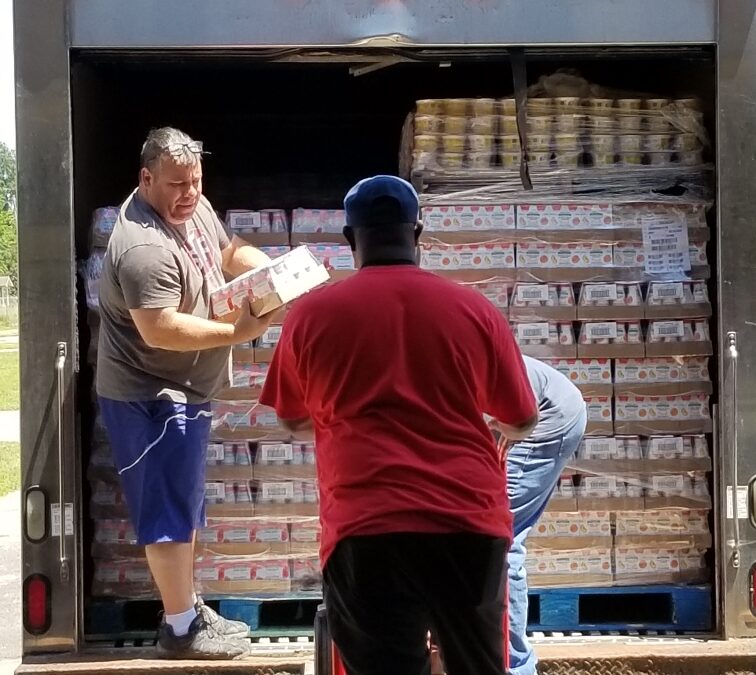
Sep 17, 2020 | Community News, News
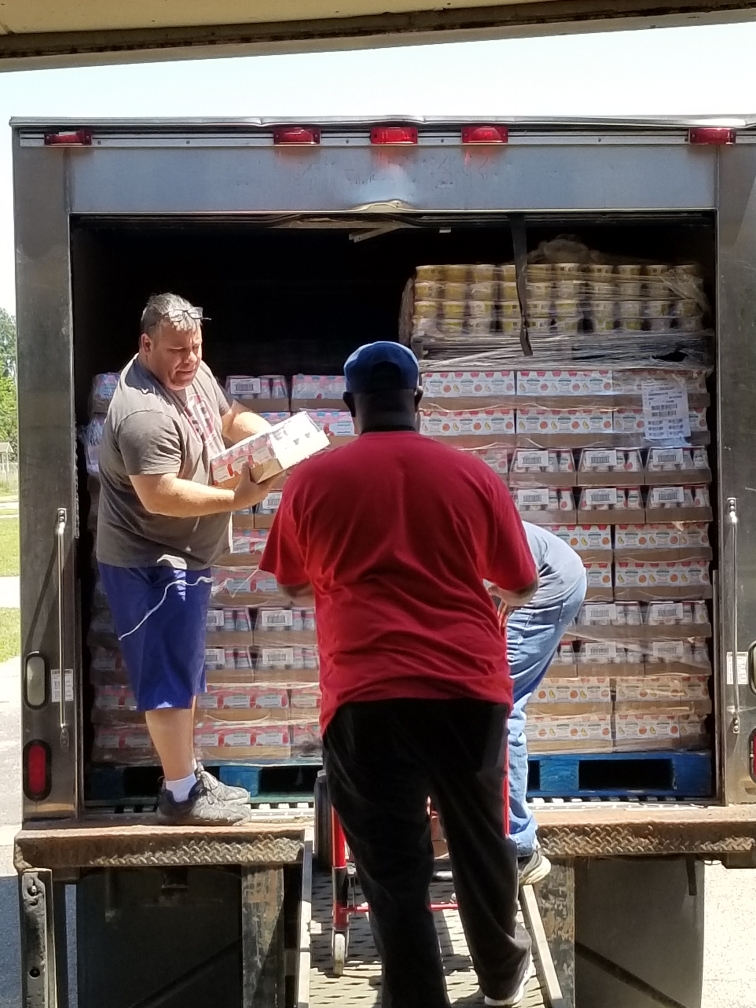 You’ve probably been through Loris a time or two on your way to Myrtle Beach. It’s a small, quaint town just a 20-minute drive to the thriving Myrtle Beach – a tourist destination full of jobs for locals in the hospitality business. When COVID-19 hit, life changed for many in Loris and the surrounding area due to unemployment. More people were experiencing food insecurity for the first time.
You’ve probably been through Loris a time or two on your way to Myrtle Beach. It’s a small, quaint town just a 20-minute drive to the thriving Myrtle Beach – a tourist destination full of jobs for locals in the hospitality business. When COVID-19 hit, life changed for many in Loris and the surrounding area due to unemployment. More people were experiencing food insecurity for the first time.
The Kingston Lake Education and Business Center in Loris applied for a Rapid Response Mini-Grant from Eat Smart Move More South Carolina to help with an influx of people in need of food as unemployment increased. The Center used existing partnerships with Kingston Lake Missionary Baptist Association, Help Hands, Black Venetians of Horry County, City of Loris, local churches, and others to promote their efforts.
“Our weekly food bank is over three years old, and COVID-19 has moved the number of people we serve from around 150 to, on average, over 500,” said Reverend Hattie Graham of the Kingston Lake Missionary Baptist Association. “The mini-grant was very helpful in providing food to our neighbors.”
Organizers were able to purchase 140 pounds of chicken and pay for transportation to Orangeburg, SC to pick up more than 100 boxes of donated fruits and vegetables from the Baptist Educational and Missionary Convention of South Carolina – a new partner for the Center. Not only did they serve the Loris community, but they also reached people in Longs, Green Acres, Cedar Branch, Red Buff, Finklea, Green Sea, Conway, Bucks Ports, Bayboro, and some in Tabor City, North Carolina.
Community organizations across South Carolina, like the Kingston Lake Education and Business Center, are stepping up to the challenges presented by the pandemic and connecting with new partners to get healthy foods to families and individuals in need. To learn more about the Center, visit their website or Facebook page.
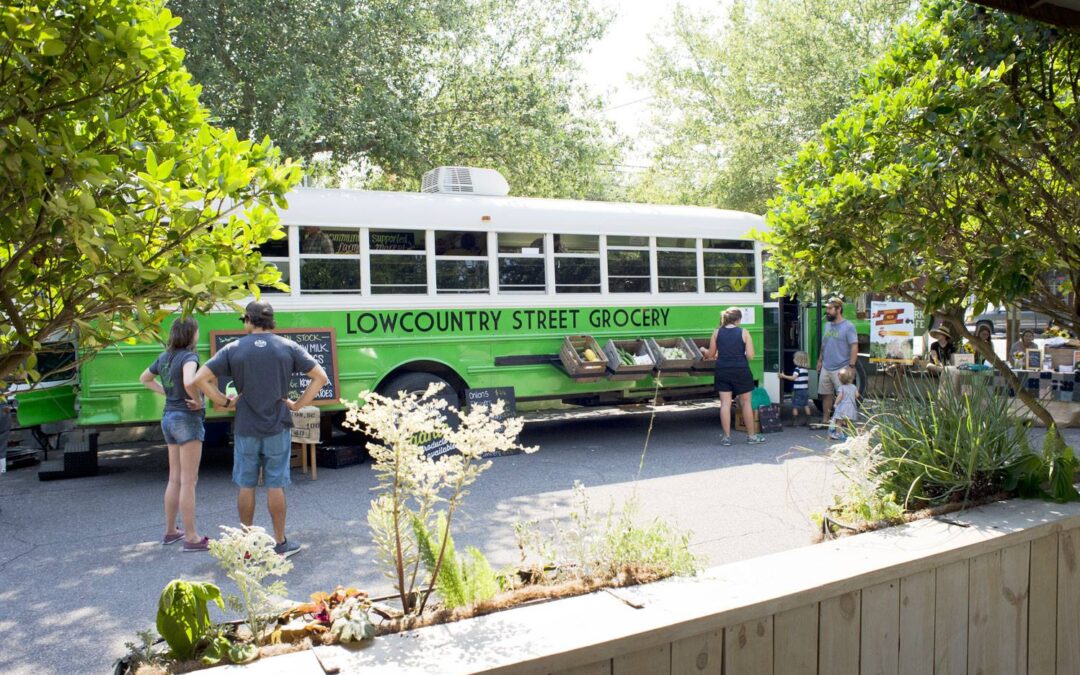
Sep 17, 2020 | Community News, News
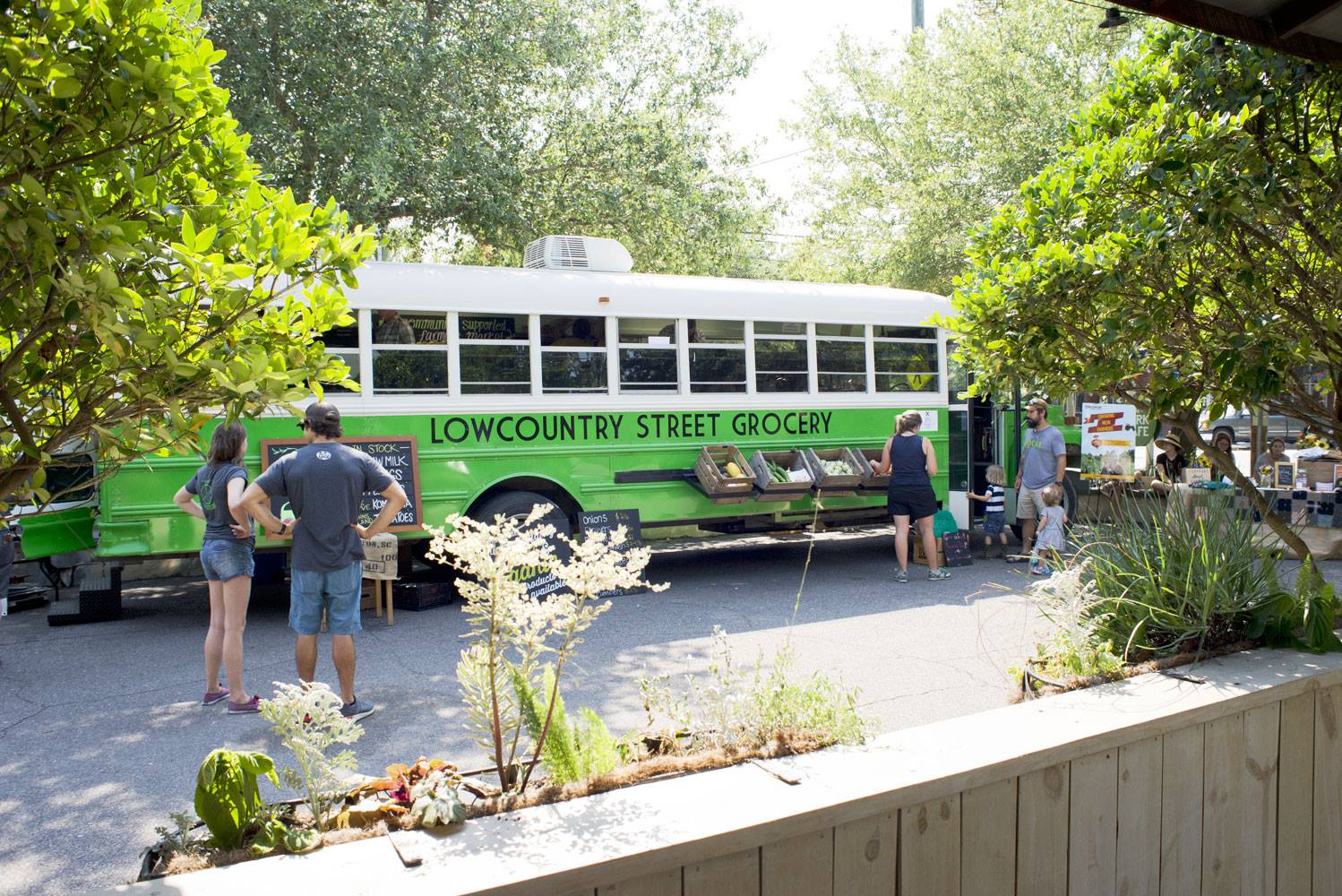 Food deserts can be found almost anywhere in South Carolina, including popular metropolitan areas like North Charleston. The area is not booming anymore. The population has declined over the years to roughly 113,000 residents and the median household income is less than $40,000. That’s a stark contract compared to surrounding communities like Charleston, Mt. Pleasant, and Summerville.
Food deserts can be found almost anywhere in South Carolina, including popular metropolitan areas like North Charleston. The area is not booming anymore. The population has declined over the years to roughly 113,000 residents and the median household income is less than $40,000. That’s a stark contract compared to surrounding communities like Charleston, Mt. Pleasant, and Summerville.
Lowcountry Street Grocery (LSG), a mobile farmer’s market, recognized these disparities and the nutritional needs of the community. They’ve made healthy, affordable food and equity their mission, and they’ve been very successful in a short amount of time. So, when COVID-19 hit and they learned about Eat Smart Move More South Carolina’s Rapid Response Grant opportunity, they wasted no time in applying.
They were awarded a mini-grant to provide healthy food to community members in need due to the pandemic. In their application, LSG identified senior and other high-risk populations as their target to reduce grocery store trips in an effort to protect them from contracting the coronavirus. LSG was able to provide 85 free, fresh, and local grocery bundles to individuals and families in the Russdale, Ferndale, Liberty Park and Highland Terrace neighborhoods.
“We have long-standing partnerships with numerous community organizations which has allowed us to quickly respond to those in need during this crisis. However, with the assistance of this grant, we were able to offer fresh, local produce deliveries to neighborhoods that are considered to be low-food access with the assistance of a few key community partners that helped identify those in need,” said Olivia Myers, Lowcountry Street Grocery.
Myers added, “These relationships have ignited further conversation about how we can continue to serve the neighborhoods of Russdale, Ferndale, Liberty Park and Highland Terrace in a sustainable manner through our Staples program that incentivizes the Health Bucks Program. We plan to nurture long-standing relationships with these community leaders.”
LSG is a great example of knowing your community and the needs of its residents. Since the food distribution, LSG secured an additional partnership with Trident Agency Area on Aging who has agreed to provide funding for weekly grocery deliveries for a number of their members. They also anticipate working towards solidifying funding to be able to continue to provide fresh food for the individuals in the Russdale, Ferndale, Liberty Park and HIghland Terrace neighborhoods.
To learn more about Lowcountry Street Grocer, visit their website or Facebook page.
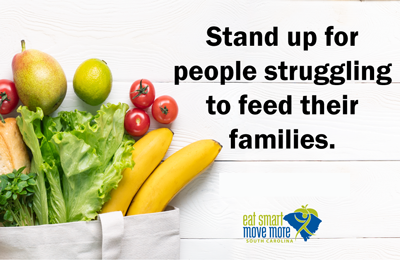
Jul 1, 2020 | Community News, News
 Eat Smart Move More South Carolina (ESMMSC) was awarded $50,000 from The One SC Fund: COVID-19 Response, a fund housed at Central Carolina Community Foundation, to provide an immediate need to healthy foods to communities and to create an interactive map to help community members find healthy food sources across the state. ESMMSC also worked with Healthy Palmetto to establish a physical activity resources page.
Eat Smart Move More South Carolina (ESMMSC) was awarded $50,000 from The One SC Fund: COVID-19 Response, a fund housed at Central Carolina Community Foundation, to provide an immediate need to healthy foods to communities and to create an interactive map to help community members find healthy food sources across the state. ESMMSC also worked with Healthy Palmetto to establish a physical activity resources page.
“We were able to feed hundreds of families in the targeted counties during a time of great uncertainty for families that normally do not have to worry about where their food will come from,” says Meg Stanley, executive director of ESMMSC. “For some of these communities that we served, this was the first time they received fresh produce from an organized food distribution site.”
Approximately $46,000 was distributed to 40 organizations across the state to address food insecurity gaps, such as fresh produce and personal protective equipment purchases, and transportation to get the food to community members. Community organizations in the following counties were funded: Allendale, Bamberg, Beaufort, Charleston, Chester, Dillon, Dorchester, Fairfield, Greenville, Greenwood, Hampton, Horry, Jasper, Kershaw, Lancaster, Laurens, Richland, Marion, Spartanburg, Williamsburg, and York.
 In addition to funding community food insecurity needs, ESMMSC also invested in a new online interactive map of healthy food sources.
In addition to funding community food insecurity needs, ESMMSC also invested in a new online interactive map of healthy food sources.
“Anyone can use the map to search for local healthy food sources that are being offered at low- or no-cost,” says Stanley. “We need organizations that have food programs, like summer feeding sites, food banks, food pantries, and other food programs, to add their services to the map to make it more comprehensive.”
Like the databases released on the ESMMSC website in March, the map features location, contact, operations, and other helpful information for individuals and families seeking help accessing healthy foods. There’s also a tab for organizations that provide services in Spanish, those that are implementing safety practices related to COVID-19, and ways to give back to local organizations featured on the map.
In addition to the interactive map, community members can also access physical activity resources on ESMMSC’s COVID-19 Resources page. Developed by Healthy Palmetto, the state coalition of organizations that collectively address healthy eating, active living, and healthy weight for the Live Healthy SC State Health Improvement Plan, the new page provides ways individuals and families can stay active while social distancing.
The One SC Fund: COVID-19 Response is a collaborative statewide response to food, shelter, health, and nonprofit sustainability needs stemming from the coronavirus pandemic. The fund enhances and complements the efforts already underway in several counties and regions across South Carolina and is addressing gaps in the response efforts, including support for communities that lack resources or an organized philanthropic response. The effort also provides an outlet for statewide, regional, and national funders interested in supporting the COVID-19 response in South Carolina.

 food in this food desert.
food in this food desert.

 Believe it or not, food deserts do exist in urban areas. Why? Because all neighborhoods in cities are not equal. Grocery stores don’t want to put down roots in low-income neighborhoods because they fear they won’t be successful. In Greenville, Mill Village Farms is changing that landscape and stepping up their efforts to make sure residents get fresh, locally grown produce during the coronavirus pandemic.
Believe it or not, food deserts do exist in urban areas. Why? Because all neighborhoods in cities are not equal. Grocery stores don’t want to put down roots in low-income neighborhoods because they fear they won’t be successful. In Greenville, Mill Village Farms is changing that landscape and stepping up their efforts to make sure residents get fresh, locally grown produce during the coronavirus pandemic.



 Christian-based organizations across the state have stepped up their mission-driven work to help their communities in times of crisis. In His Name-Colleton is one of those organizations that recognized the increased food insecurity problem caused by COVID-19 and need help to reach more people. They applied for a Rapid Response Grant from Eat Smart Move More South Carolina to pay for healthy food and personal protective equipment associated with their food distribution program.
Christian-based organizations across the state have stepped up their mission-driven work to help their communities in times of crisis. In His Name-Colleton is one of those organizations that recognized the increased food insecurity problem caused by COVID-19 and need help to reach more people. They applied for a Rapid Response Grant from Eat Smart Move More South Carolina to pay for healthy food and personal protective equipment associated with their food distribution program.
 You’ve probably been through Loris a time or two on your way to Myrtle Beach. It’s a small, quaint town just a 20-minute drive to the thriving Myrtle Beach – a tourist destination full of jobs for locals in the hospitality business. When COVID-19 hit, life changed for many in Loris and the surrounding area due to unemployment. More people were experiencing food insecurity for the first time.
You’ve probably been through Loris a time or two on your way to Myrtle Beach. It’s a small, quaint town just a 20-minute drive to the thriving Myrtle Beach – a tourist destination full of jobs for locals in the hospitality business. When COVID-19 hit, life changed for many in Loris and the surrounding area due to unemployment. More people were experiencing food insecurity for the first time.





